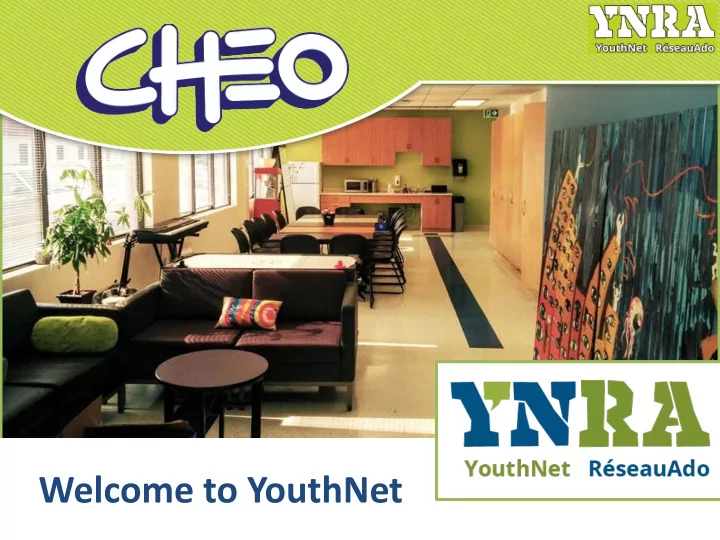

YouthNet RéseauAdo Welcome to YouthNet
What is YouthNet RéseauAdo? . YouthNet RéseauAdo offers a wide range of mental health services to youth aged 13 to 20
Mental Health Intervention Promotion Presentations Discussion Groups 8 week group programs Info Booths Bridging Counselling Youth SafeTalk Training Advisory Committee Student Wellness Yearly Trend Review Committees Program Evaluation Stigma Reduction Summits Wellness & Stigma Research Reduction
Youth Advisory Committee (YAC) YouthNet programs are designed, informed, and overseen by a Youth Advisory Committee This volunteer working group is open to all youth mental health advocates
Mental Health 101 Who has a mental health? What is mental health? Why do we TALK about mental health?
How do we talk about Mental Health? Balanced: Stuffy nose: A bad flu: Serious pain: Physical Body You It’s not After a health reacts in might be getting any serious car a “normal” getting better after accident - range for you! a cold a week you go to the ER Balanced: Feel Really down: Serious Mental Feelings and stressed: You Struggling for pain: health thoughts are may be a while - you Thoughts of in a “normal” anxious may be suicide - you range for you! after a fight missing school call a parent with a friend or crisis line
YouthNet’s Magic Formula Starting the conversation / How will it be Resources understanding engaging? mental health
Did you know? • The fear of stigma often delays diagnosis and treatment, yet early intervention can make a dramatic difference in quality of life. • One in six children diagnosed with a mental health problem or mental illness will get treatment. • 40% of parents say they would not admit to anyone, not even their doctor, that they had a child with a mental health problem or mental illness.
Let’s start by talking
Let’s start by talking
Let’s start by talking
Common Stress Factors Affecting Youth School - test taking - pressure on excelling academically - friendships - lunch time - managing conflict in school - romantic relationships - gender identity and disclosures in school - bullying - cyberbullying - electronics
Common Stress Factors Affecting Youth Home - family conflict - siblings - siblings living with a mental illness/physical illness - autonomy vs dependency - divorce / separation / loss of parent - anxiety and leaving the home - gender identity and disclosures in the home - cyberbullying - electronics and disconnecting at home
Common Stress Factors Affecting Youth Individual Changes - social changes - emotional changes - understanding hormonal changes - growing pains - managing expectations - managing own way of coping - understanding stress and the response in ones body - learning how to adapt in stressful situations - creating online / social media presence and managing those expectations
Recognizing potential mental health concerns Youth will experience a lot of emotional and social changes so the most important thing to note are: 1. Intensity: Have there been major changes in your youth’s mental health? 2. Duration: Has this been persisting over a period of time? 3. Interference: Is this interfering with your youth’s daily life?
Recognizing potential mental health concerns Youth will experience a lot of emotional and social changes so the most important thing to note are: 1. Intensity: Have there been major changes in their mental health? Are you noticing changes in their speech, their emotional reactions to situations? Detaching from family and friends? Losing interest in hobbies?
Recognizing potential mental health concerns Youth will experience a lot of emotional and social changes so the most important thing to note are: 2. Duration: Has this been persisting over a period of time? How long are these changes? 1 week? 1 month? Is it triggered by an event?
Recognizing potential mental health concerns Youth will experience a lot of emotional and social changes so the most important thing to note are: 3. Interference: Is this interfering with their daily life? Is this interfering with their daily functions? Are they having a hard time leaving the house? Getting out of bed? Ignoring friends? Spending too much time online?
Let’s Do: Implementing We found that talking to youth about mental health and teaching them strategies is easier and more effective when you implement activities. Let’s try it out.
The “do-ing” in Mental Health • Roses and Thrones • Mindful Check Ins (use online apps to help) • Coping wall strategies – take one, leave one • Gratitude Wall Challenge • Find a quote and talk about its meaning and what you like about it • Adult Ally conversation • Contact based education – go to talks, watch documentaries on mental health • Modeling self-care • Gadget Free outings and activities
Let’s Connect: Resources Know your resources in the community - Walk in clinics - Youth Services Bureau - Talk to your school about their guidance counsellor / social worker - YouthNet and PLEO - BeSafe App
Most Importantly, Patience, gratitude and being kind to yourself Use the resources available to you and your family Talk to your family doctor about mental health
Learn more about us Come check out our website! www.youthnet.on.ca Facebook.com/YNRAottawa @CHEOyouthnet @CHEOyouthnet
Need more information? Topic Contact General inquiries, career & volunteer Mary Alexandrou opportunities, media, safeTALK training, malexandrou@cheo.on.ca fundraising/donations School/Community presentations, discussion Stefan Domaradzki groups, info booths, Youth Advisory Committee sdomaradzki@cheo.on.ca Intervention Programs, registration/wait list, Zsofia Grandpierre drop-ins zgrandpierrecook@cheo.on.ca Student Wellness Committees, Stigma Mackenzie Barnett Reduction Summits mbarnett@cheo.on.ca Bridging Counselling & Clinical Backup Parisa Rostami prostami@cheo.on.ca Research, Program Evaluation & Tools Elyse Champaigne-Klassen EChampaigne@cheo.on.ca CHEO’s YouthNet RéseauAdo 300B / 2305 St. Laurent Blvd 613-738-3915 @CHEOyouthnet Facebook.com/YNRAottawa @CHEOyouthnet
Recommend
More recommend